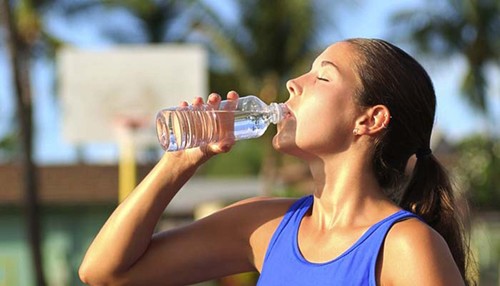© Turkuvaz Haberleşme ve Yayıncılık 2024
The most difficult step in starting to exercise is perhaps to take action. Most of us claim an intensive work life as an excuse. Studies show that the most popular reason behind avoiding exercise is fatigue and dehydration. I always mention that one of the basic requirements of leading a healthy life is exercise and that you have to move, especially for heart health.
A motionless lifestyle results in low metabolic functioning, hence, it may be difficult for people to adopt a more active lifestyle. For starters, you may start by trying to be active as much as possible during the day; For example, you can use stairs and take short walks.
The human body needs calories and liquids to be able to feel good during physical activity. People who are busy with sports should eat well as they need more energy than others who do not exercise. A regular diet fortifies the immune system and keeps your energy high. Here is some advice for you to get used to exercise and keep you energy levels high.
Do not starve yourself

Rule number one of being energetic all day long is not to be hungry. In cases of malnutrition or not eating at all, it is extremely difficult to do exercise. For this reason it's important to consume carbs in small quantities to avoid hypoglycemia to keep your energy up. Experts say that a healthy diet program must consist of three basic meals and two snacks.
Consuming complex carbs also helps keeping your blood sugar levels on the line, which causes your energy level to increase. A bowl of oatmeal with fruits helps you to prolong your exercise, since oats are a fiber-rich food.
A fiber-rich diet is of high importance for a healthy digestive system. Wholegrains and fiber-rich fruits and vegetables are the nutrients that must be in your daily diet. A person with a normal diet may consume about 15 grams of fiber per day. However, experts say that your daily fiber intake should be 30 grams. People should consume fiber-rich nutrients to compensate for the 15 grams in question. Another benefit of fiber for the human body is its functioning as a water holder in the stool. This way you don't get constipation. Apples come first on the list of foods with fiber-rich nutrients.
You definitely have to stay away from fatty foods for a healthy digestive system. The excessive consumption of fat makes digestion difficult and slows it down. Keep margarine and solid grease away from diet, and consume more olive oil.
Probiotics are the beneficial microorganisms living in the human bowels. Probiotics - beneficial bacteria - protect the body against harmful bacteria. These beneficial bacteria also control other bacteria in the bowels so it is important to make probiotics a part of your daily diet.
Then what is the best source of probiotics? Of course it is yogurt. Raspberry, which has grown in popularity in Turkey recently, is the best bowel-friendly fruit thanks to its fiber-rich nature. Just a cup of raspberries contains eight grams of fiber. It's twice the fiber amount of strawberries. Recent studies show that citrus is bowel-friendly as well. The vitamin C in citrus keeps the stool easy going and the fiber in it helps the defecation by enlarging the stool. Researchers say that the flavonoids in citrus function almost like a deobstruent.
Combine carbs with proteinIn the human body, muscles are fed by glycogen, another name for glucose. Just like wheat, fruits, vegetables and carbs it also turns into sugar and are absorbed almost immediately. However, they wear off in a very short period of time and the process results in hypoglycemia and fatigue. To keep the body energetic, carbs should be consumed with protein, so that blood sugar levels can be kept stable and the body can stay more active during the day.
Drink water, a lot

Dehydration and loss of body water results in poor performance and fatigue. If you do not drink enough water, you may have headaches and feel dizzy. A loss of water, even at a low level, may weaken even the best performance. Do not wait until you get thirsty during exercise. Take a sip of water every 15 minutes during walks.
Do not exceed the calorie limitEnergy appetizers, especially protein bars, are high calorie foods they can prevent fat burn. Instead of these, drink plenty of water before exercise and have a 100-200 calorie snack if it is less than two hours after your last meal or snack.
Choose the best proteinConsume protein and carbs in every snack or meal. Protein intake is good for preventing hyperglycemia after a meal or snack, helping to expand the time it takes for you body to use up energy. A person who follows a regular walking plan can consume 0.5-0.75 grams of protein per kilos daily. Chicken, fish, lean meats, low-fat dairy products, legumes, nuts and nut pastes are good sources of protein. Every 100 grams of lean red meat and chicken may contain up to 27 grams of protein, while a glass of skimmed milk contains 10 grams.
Watch the food intake
Leading an energetic life requires a good diet every day. A diet rich in terms of calcium, Vitamin D and magnesium will certainly increase your energy. It's possible to strengthen the bones while walking, however, vitamin D intake is important in achieving this. A person needs 1000-1,200 milligrams of calcium per day, related to their age. (People over 50 need more) via dairy products and calcium supplements, you can take just 500 grams of calcium per intake. The best source of vitamin D is milk (400 IU per day.) Magnesium, of which a person needs 400 grams per day, can be taken via cereals, nuts and spinach. Iron and zinc consumption is also important for energy. Meat, chicken and some fish species are rich in iron and zinc.
Consume fish
Studies show that antioxidants may help to decrease the inflammation that arise after exercise and stress. To be able to make the best use of them, be sure that they contain enough good fat. Consume fish like salmon, tuna, mackerel and sardines, which are rich in Omega-3.
Banana to fuel potassium levels
The most important reason for muscle cramps is a potassium deficiency. Put bananas on your list. This food meets 9 percent of your daily potassium needs.
Limit fat intake
Fat is the nutrient that leaves the stomach last, so it slows down digestion. In other words, the only fat suitable for exercise is Omega-3. Fats other than Omega-3 may cause fatigue. However, if you are an endurance athlete or an ambitious walker, a little fat intake can help you. It assists or long-lasting exercise and regulates blood sugar like protein does.
